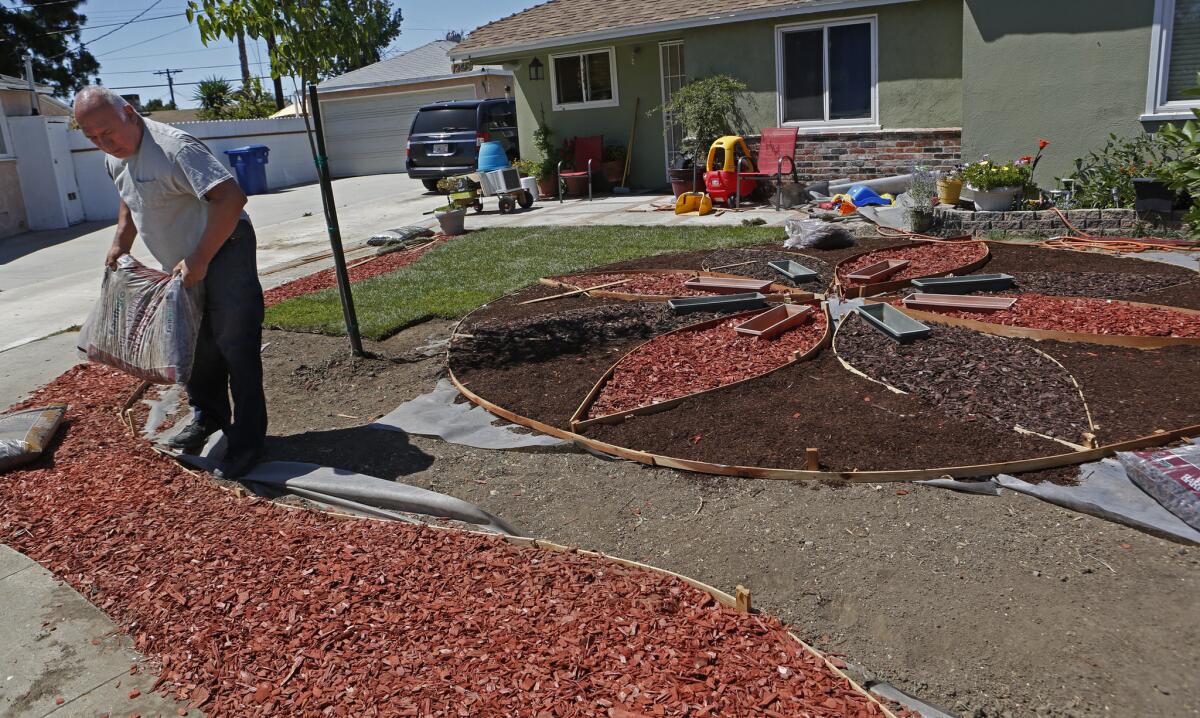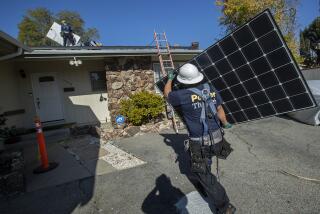MWD: Residents may have to pay taxes on their turf rebate money

Richard Delgado, 65, replaces most of the turf in his front yard with three different colors of bark in June. He was denied the rebate because he had not taken before photos before his grass died.
- Share via
Thousands of Southern Californians who received checks to tear out their lawns and replace them with more drought-friendly landscapes may have to pay taxes on the rebate money they received.
To prepare for that possibility, officials from the Metropolitan Water District of Southern California -- which funded a $340-million incentive program -- say they have begun collecting tax identification numbers and other information from program participants who received rebates of more than $600.
Those customers may be receiving 1099s from the MWD by the end of the year, said Deven Upadhyay, an MWD manager. But Upadhyay emphasized that the agency has “not made a decision” about whether the forms will be sent.
“There is a bit of lack of clarity on this,” he said.
See the most-read stories this hour >>
California provides a tax exemption for turf removal rebates, Upadhyay said, but the federal tax code only provides an exemption for rebates related to energy efficiency. The state Franchise Tax Board has asked the IRS to clarify whether the exemption also applies to water-efficiency rebates, Upadhyay said.
MWD is awaiting a response. The agency would be supportive of an exemption, Upadhyay said.
In the meantime, people in the process of getting a rebate must now provide their tax identification numbers online. MWD officials are also emailing customers who have already received their rebate checks and asking them to provide the information that the agency needs.
MWD has already been providing 1099s to commercial customers that got more than $600 in rebate money, “so it is something that’s been on our minds,” Upadhyay said. There has always been language “about the potential tax liability,” in signup agreements, he added.
“We’re only a few weeks into this, so who knows if this becomes an issue or not,” Upadhyay said. “Is it something that people are going to be concerned with that would affect their participation? I don’t know.”
So far, more than 24,000 homeowners have already received or have been approved to receive a rebate of $600 or more, according to MWD records.
In some cases, residents received rebates of more than $70,000. The average residential rebate totals about $3,000, according to the MWD data.
The $340 million in program funding ran dry in July.
“We’re certainly not in a position to be providing tax advice,” Upadhyay said, though he added, “if it is something they’re going to report on their taxes, the larger the amount, the more potential tax liability they would have.”
Twitter: @ByMattStevens
Twitter: @taygoldenstein
MORE ON CALIFORNIA DROUGHT:
California seeks to build one of world’s largest recycled water programs
Artists’ labyrinth in Glendale reminds people there’s a water shortage
Some growers can divert water again amid drought, regulators say
More to Read
Sign up for Essential California
The most important California stories and recommendations in your inbox every morning.
You may occasionally receive promotional content from the Los Angeles Times.












